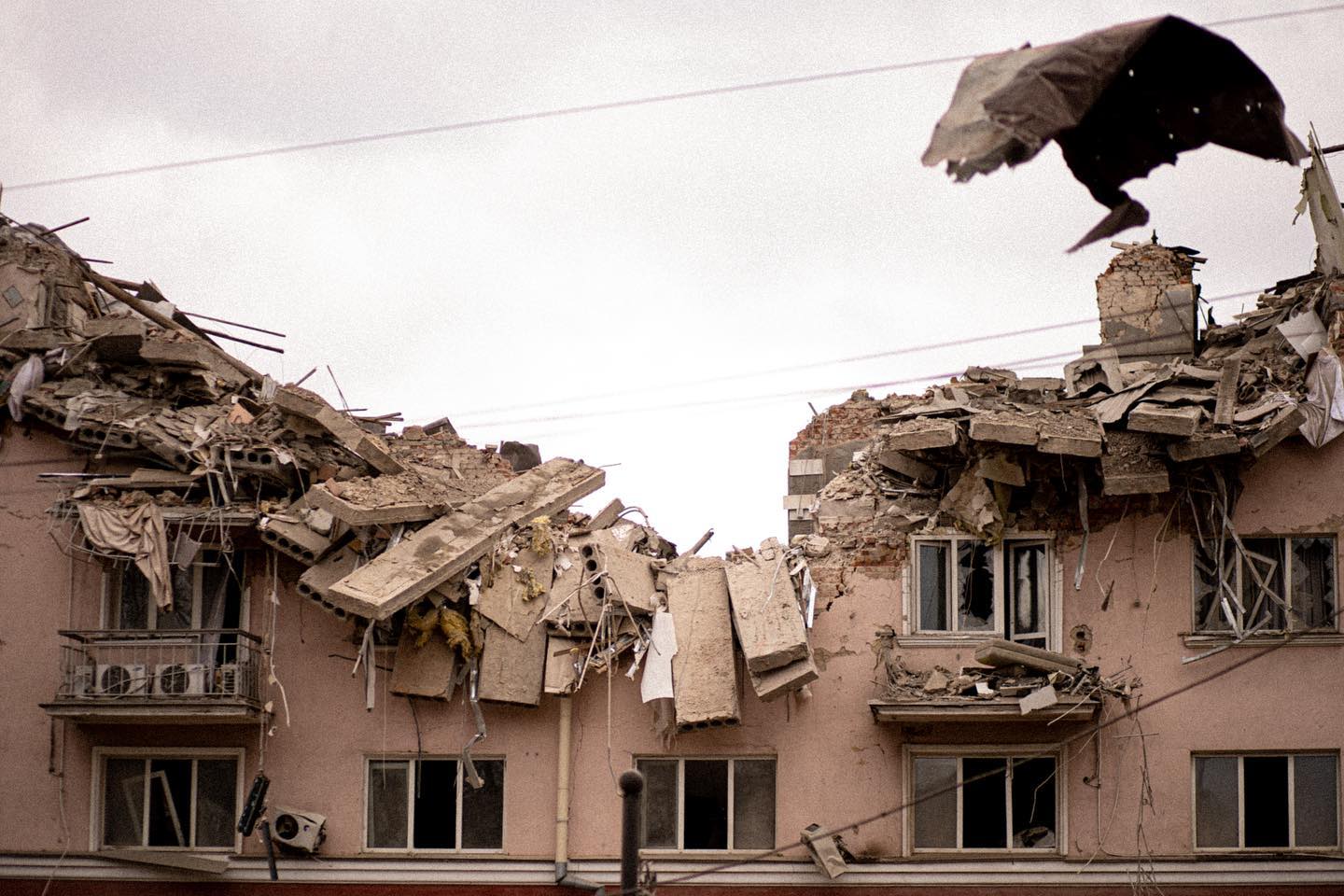
Ten Days in Chernihiv
For twenty-two days now, I have been wearing the red sweater given to me by a friend from the Ivano-Frankivsk region.
At night in Zhashkiv, the children took off their socks, and nobody scolded them. It was the thirteenth of March, 11 p.m. Twelve hours ago we fled Chernihiv.
They are the children of a lady who, after weeks together in Chernihiv, I can now call a friend. Let’s call her Vita, for her own safety.
So Vita’s children, two little boys, took off their socks in their sleep. They don’t like sleeping in socks. And now we leave them be. Although we would nervously put them back on before.
Every night, we would spread blankets on the floor near the cellar and go to sleep huddled together to keep warm. The radiators were off last night as there had been no running water for heat for several days. And no electricity. Or mobile phone signal. But this wasn’t the toughest thing. At night the cats knocked over the only jar of water we had—our reserves. I almost burst into tears.
When everyone curled up on the floor, the children would snuggle up to us to keep warm and then they would begin to undress.
We knew that a bomber could fly over the building at any time. And we would have to take the sleepy children down to the basement. Or, should the building catch fire, we would need to take them outside.
And they were not wearing socks.
Someone Else’s Yard
We returned to Chernihiv on March 3, ten minutes after the Russians dropped eight bombs on a residential area. Several houses were destroyed, broken in half, scorched. People were pulled out from under the rubble throughout the day. Many of those killed were outside. Pharmacies and shops had just reopened, so people were standing in queues.
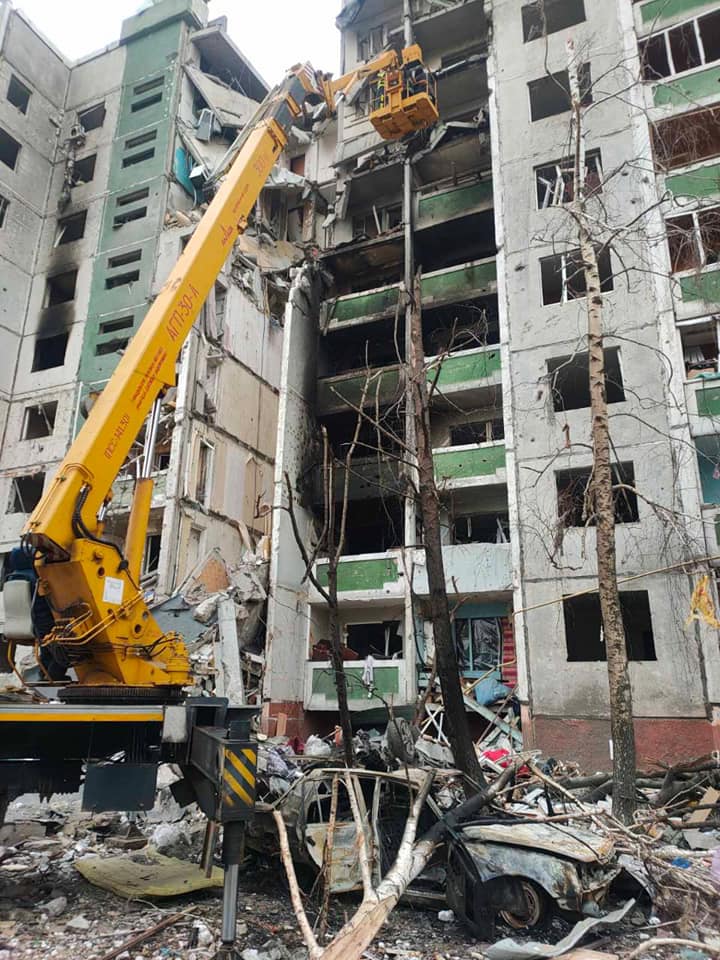
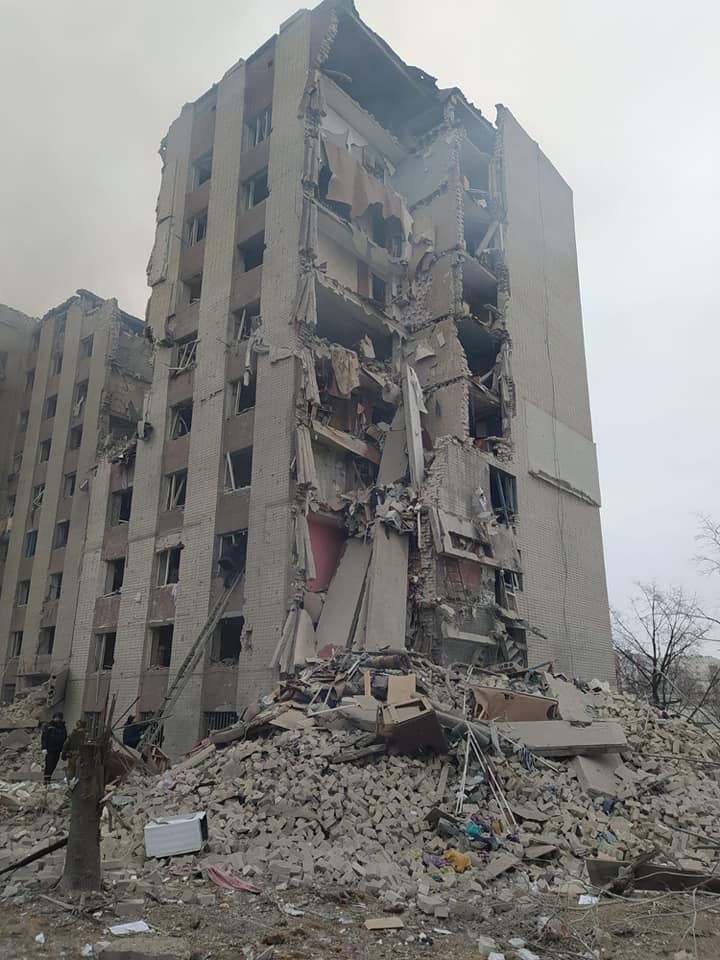
Over time, Russians would open fire more often on people standing in queues. The shop where my husband and I would get groceries after walking our dog was shelled with Grad MRLs. A dozen people waiting for bread were killed. The next day they fired at people queuing for water.
Though we returned to the city, we could not go home. A shell fragment hit our building on the second day of bombing. Our apartment complex is on the outskirts of the city. It is on the route through which they are trying to break into the city.
We quickly came to terms with the fact that our home was no more, having locked up our books, plants, paintings and everything we had. I didn’t take the nine coral beads with me that my husband had given me before the war, or the photo albums of our grandmothers we had meant to digitize.
So the next day I said goodbye to my husband in someone else’s yard. He had a backpack over his shoulders containing food for the first day, a metal bowl, a spoon, and some things to keep warm. We shook off the cigarette ashes down at our feet. Soon my husband slowly faded away in the morning mist. The last thing I could see before he disappeared completely was the pink sleeping mat hanging off his brother’s backpack. In eight years, this is the second man in my life I have sent to war. The first was my father.
Coffins
The city needs bandages, fuel, generators, flashlights for surgeons, painkillers, bleach and carpenters to help municipal workers build coffins. The Chernihiv City Cemetery on the outskirts is under constant shelling, and one funeral can turn into several more. Hundreds of local people were hiding in the basement of the church in the cemetery, until that caught fire as well. The survivors were evacuated from the cemetery by bus.
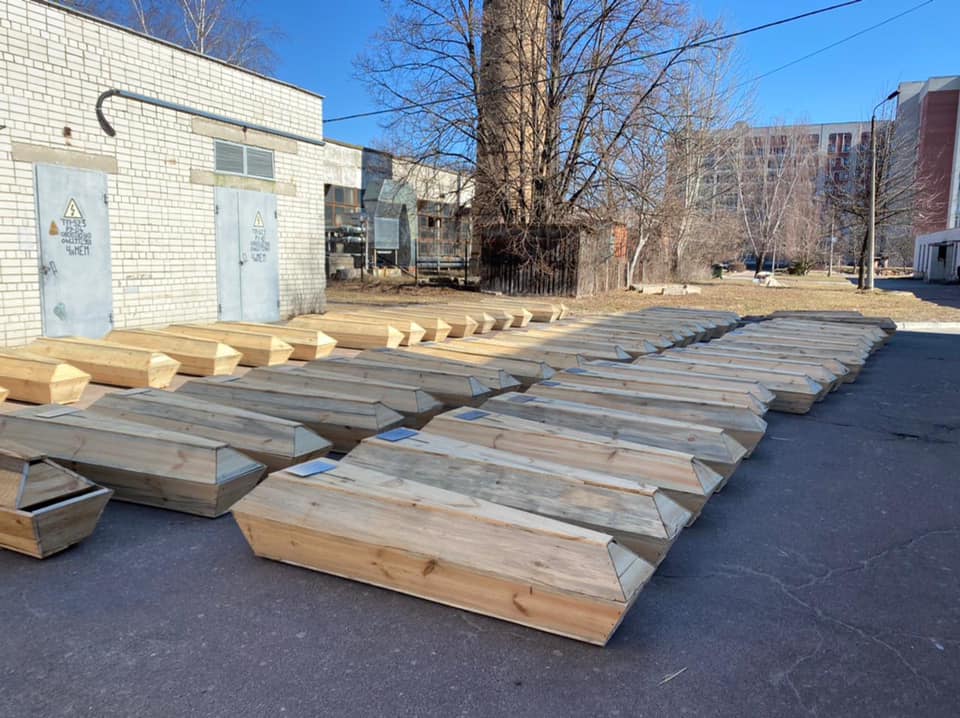
Now people are buried in coffins made of planks in the city park, which is home to a pine forest, birches and hundreds of exotic trees planted half a century ago. For years Chernihiv residents fought with the City Council to protect this park from the designs of construction companies. People wanted a park, while the city wanted a hotel and a restaurant. Now on the outskirts, near the old city cemetery that was closed a long time ago, people are digging long trenches. After the war, all the dead will be taken away. No doubt.
Water
The children are making siren noises and begging to go down to the basement—even though they spend most of their time there. Vita and I stay in the house. The house is made of wood. We are equally afraid of it catching fire and collapsing. So we keep watch upstairs so that someone could pull the children out.
While there was running water, Vita was constantly doing the laundry. While there was electricity, I vacuumed, cleaning up the sand we had brought up on our shoes from the cellar during the day. The vacuum cleaner and the washing machine almost masked the sounds of explosions, screeching roofs and even planes.
Many people have no water or electricity, but municipal workers are repairing everything they can while under fire. These people are being killed while trying to ensure I can have at least somewhat of a normal existence. One night the Russians shelled the pumping station. A security guard, a station worker and several members of his family were killed.
That worker’s name, they say, was Anatolii. Tolik, for short. He was about fifty. One of the Chernihiv residents, who now serves in the military, said that he had known him for a few days. Anatolii would drive past the trenches to work at the water utility company and proudly said that he was providing the city with water.
When the tap is dry and the lights do not turn on, even those people who resolved to stay until the end decide it’s time to leave. In half a day, the electricity would come back on in some areas. And the people would choose to stay; it’s a typical story for us. Because we were there too. These days, as I’ve learned, there is no electricity or water whatsoever. Generators pump water, which is delivered to the districts. The Russians fired on one of these water supply trucks.
While we had water, I was afraid to take a shower. It would be embarrassing to die naked. My aunt, a little older than me, tried to ensure her hair was clean. She was afraid of lice and facing God’s judgment with dirty hair.
Air Raids
Everyone is afraid of planes. Mostly they come at night. On the night of March 5, a Russian plane flew over us and dropped a bomb somewhere not far away, causing a pillar of fire to rise into the sky. We didn’t hear the sirens and thought it was our plane at first.
“It’s not ours! Duck!”
Our friends from a village twenty kilometers from us wrote about the red glow over Chernihiv. People thought that the Russians had set fire to the city. When things quieted down, we went out into the yard. Our hands were trembling as we opened the door to the porch.
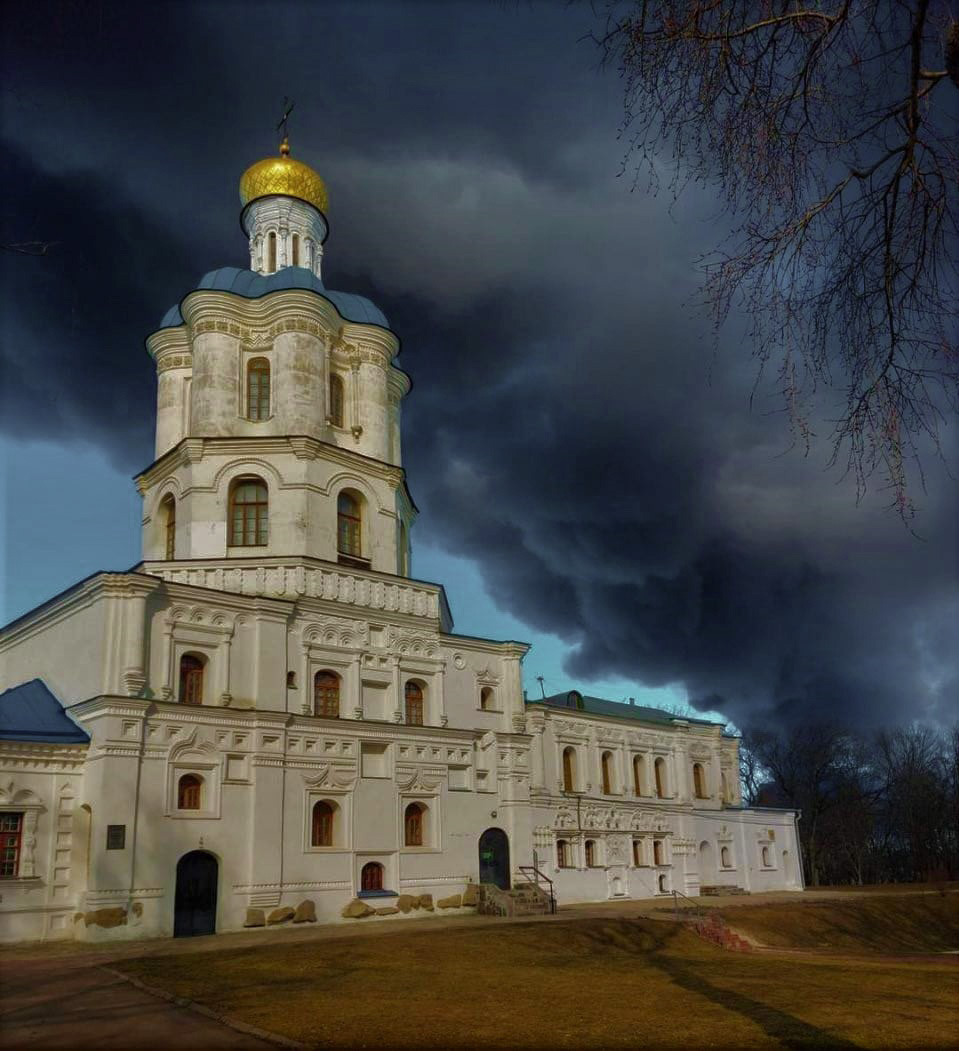
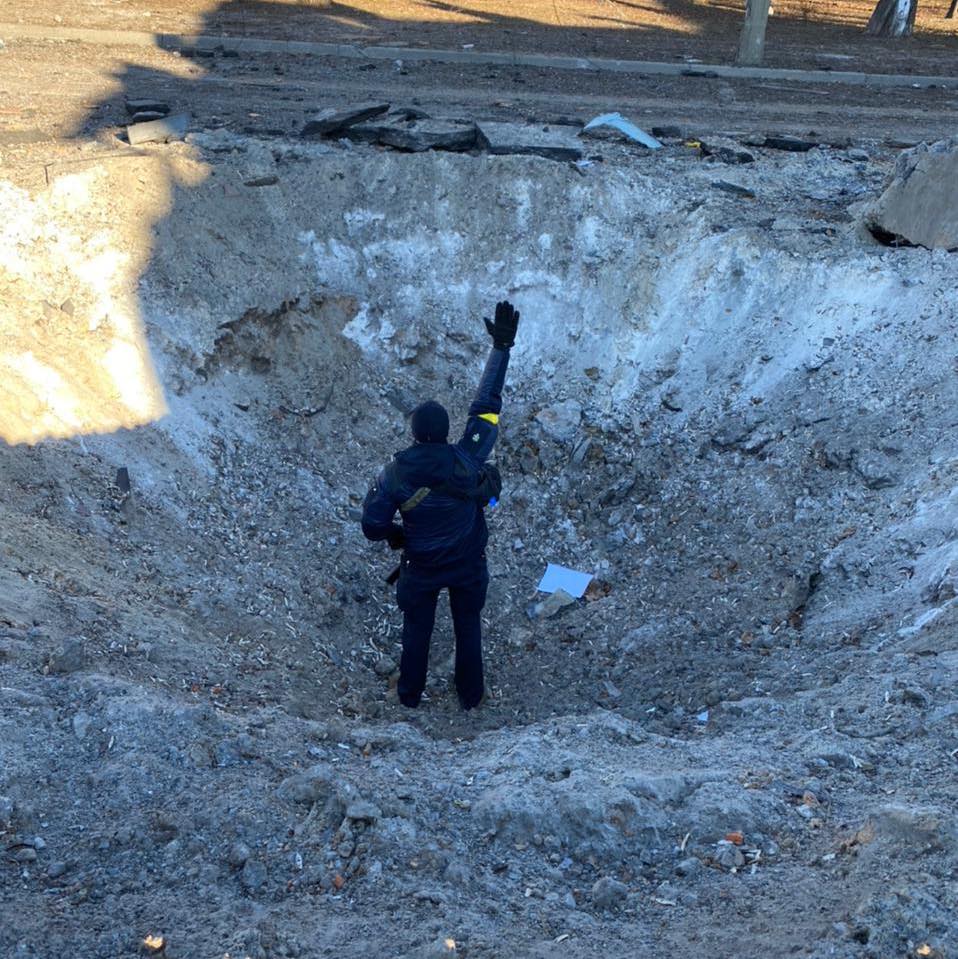
Throughout the night, I would go out to check if the fire was approaching us. The neighborhood and the house of our relatives were on fire. I slept through the last six air sirens. In the morning, one of the planes was shot down, the pilot was caught and things were quiet for a day. The pilot landed in a yard in Chernihiv, and before he was caught he killed a local man.
The Russians are trying to surround Chernihiv, yet now, as they creep towards the center, the city is being surrounded by ruins. And even there, inside these ruins, many of our acquaintances live. They are mostly older relatives, patching up a window or a roof for the third time.
People say they would like ‘it’ to happen at night so they don’t feel anything. Me too.
Apples and Gasoline
March 6 was one of the quietest days. We thought it was due to the recently downed plane. Municipal workers were loading garbage on their trucks. I got on my bike and rode through the city to a friend’s neighborhood. There were constant explosions somewhere in the distance, but people didn’t seem to take notice.
Some were standing in queues; others were riding their bikes, laden with bags. Even though some people in Chernihiv died queuing just like that a few days ago.
I rode up to my friend’s house listening to the sirens. I went in. My friend didn’t even have her windows taped up. She still goes out to smoke on her balcony. We all live like that, drawing short and long straws every day.
My friend gave me six whole apples for the kids.
I left once the sirens had stopped. A minibus was parked on the side of the road. From there, two men were taking out boxes of vegetables and fruits. People were flocking to them from all over, though the street was deserted a minute ago.
“So where did you get the gasoline to drive here?” was the first thing they asked the owner of fresh apples.
I delivered some food and cigarettes to the checkpoints and quickly returned home with the apples.
We had some gasoline and distributed it to mothers with children so that they would have enough to get them to the first gas station.
Air Raids Again
On the night of March 7, Vita and I were sitting out on the porch. First, we heard a machine gun, then the artillery launches. For some reason, we decided to go out into the yard to check how close they were, and then we heard a whistling sound overhead. It must have been a mine. Quite far away. The next one whistled right above us, and we heard explosions behind our house. A moment later, the electricity in the house was gone, followed by the phone signal. Something flew over the house and exploded nearby again. Another whistle, another explosion. I noticed that the door to the house was open and stepped towards it.
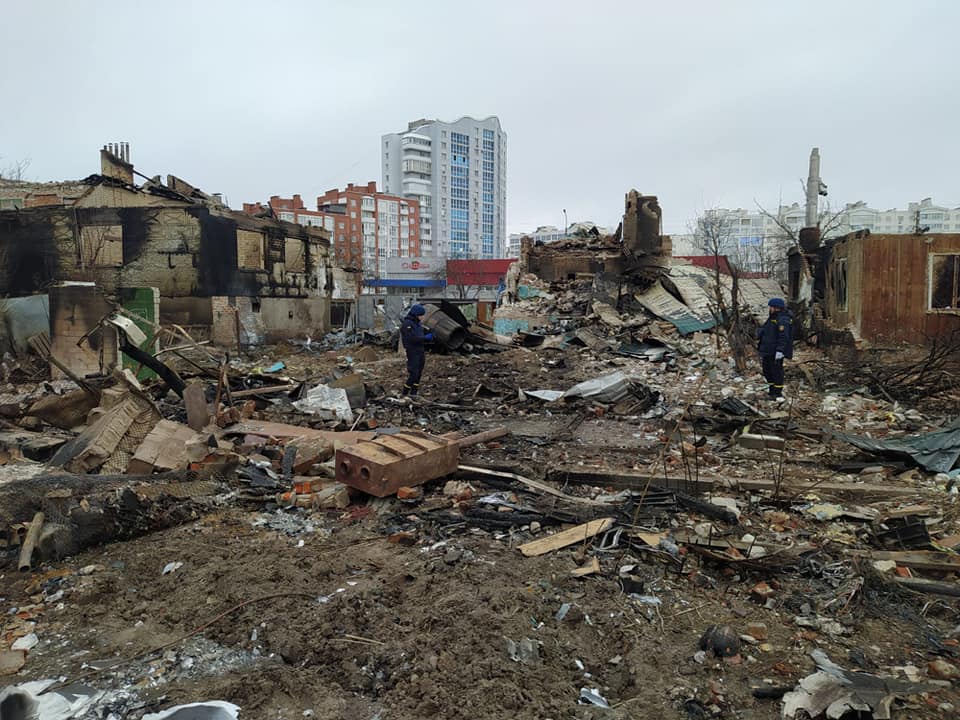
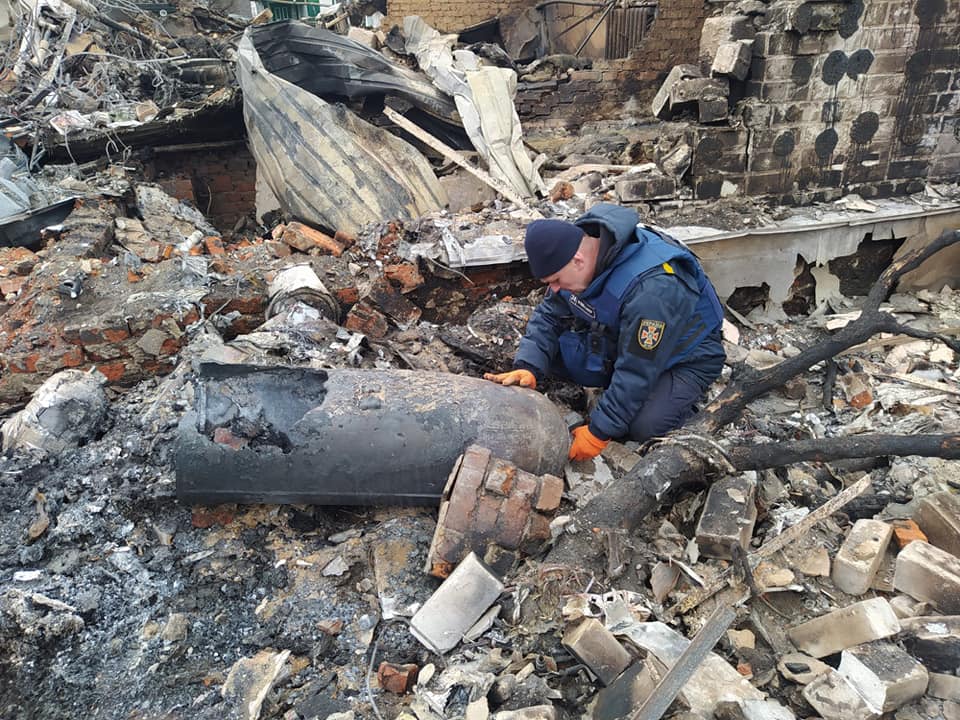
Another explosion. I was thrown to the floor as if someone had kicked me in the back. I could hear glass smashing, seemingly in our yard. I could only shout, “Duck!” We crawled down to the cellar. For three hours, we didn’t know what had happened; we were sure the bomb had hit our yard. Every once in a while I would raise the hatch to see if the house was on fire.
Meanwhile, our men were trying to call us, but we did not know that. In the end, with no signal in the basement until 1 a.m., we managed to fall asleep. I know that during that night some friends of ours came to check the house. They did not try breaking in, seeing that the house was intact. In the morning we learned that Vita’s brother’s house on the neighboring street had been hit.
That was when we decided to leave. We just had no idea how to do it. At that time, the safe route out of Chernihiv was shrinking, and constantly under fire. We made many mistakes in those twelve days. And a few correct decisions in between.
Constant airstrikes and shelling resumed on about March 9. I can’t find the words to describe the sound of a bomber over your head. I can still feel it as a cold, constant trembling in my body. Like the rattling and shaking of a house, as if it were made of paper and glue. One of the bombs fell ten minutes away from us, destroying a stadium and an old library building, one of my favorites. But now I’m more worried about the private houses around the stadium. Is everyone alive there? It was only days later that I learned Pavlo had died in the attack there. I knew him from the amateur university theater. When the war began, he enlisted in the Territorial Defense Forces.
Folk Tale
The children are full of non-military questions. Mum, what does ‘the author of an idea’, ‘director’, ‘stranger’, ‘outpatient clinic’ mean? Mum Vita answers as she washes the dishes in a bowl with the water she had stored.
“And what does a ‘Russian folk tale’ mean?”
“It’s the thing that’s happening outside,” she answers quietly, more to us than to the children.
Tulips
Along with all the other queues, there was a long one for flowers at the market in Chernihiv on March 8. Vendors offered fresh flowers in dirty vases on the empty benches where they used to sell brooms, rubber slippers, carrots and woolen socks. Roses and tulips. Military men were given flowers without having to queue.
It took me a while to realize why there were so many flowers. I thought it was because of the war. Even if you had any money, there was nothing to buy in the city. So let there be flowers.
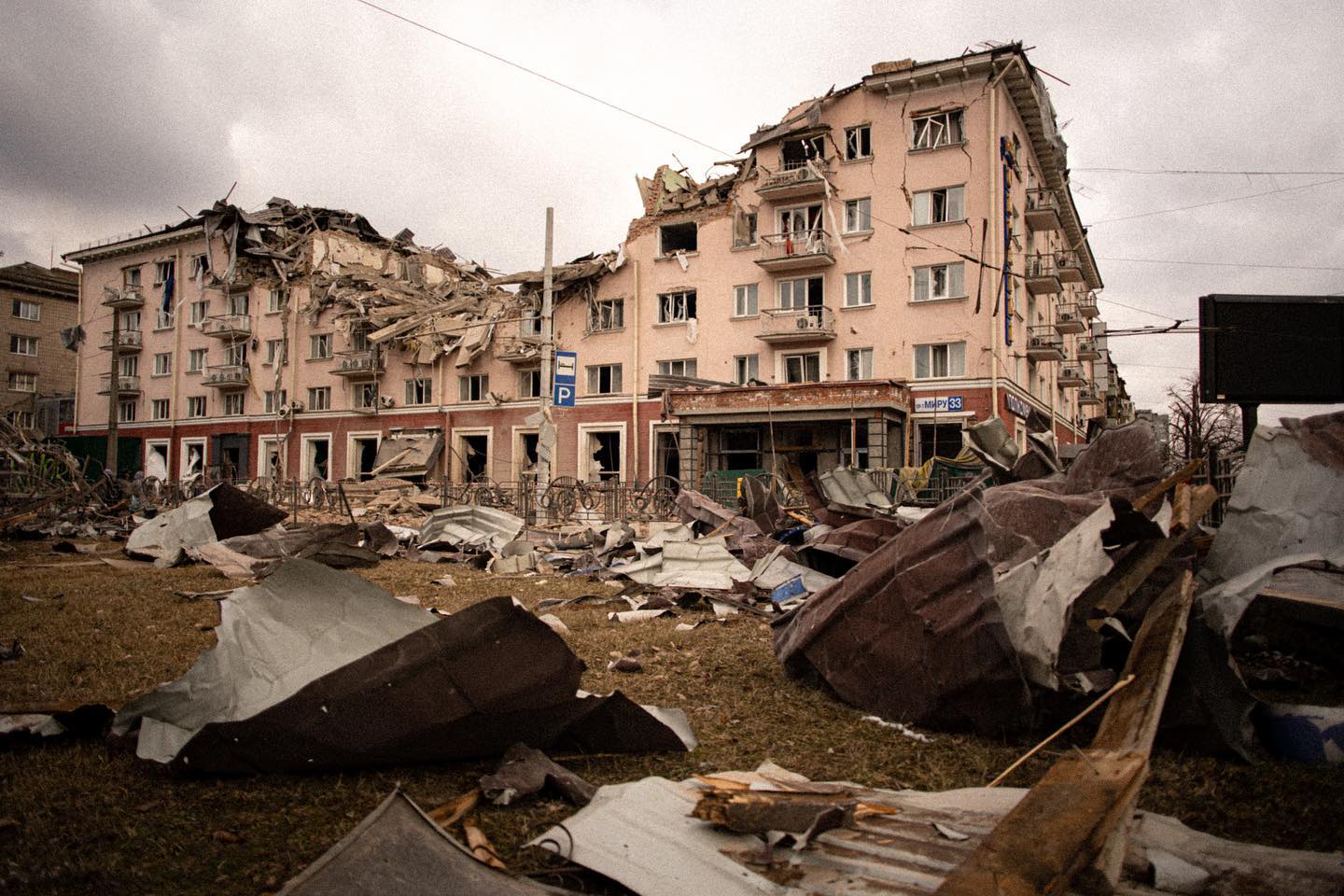
Then I was told that the flowers were being given out for free. Next to them, there was a box where people could donate whatever they could, ‘For medicines for our troops’.
It was only when I too was given a flower, greeted for the third time by a soldier at a checkpoint, that I realized it was International Women’s Day. Damn, so this wasn’t because of the war then?
War Bread
One afternoon, Vita’s godfather came to see us. He brought us freshly baked bread. The children broke off the top and ate it with gusto. We still had food and some old dry bread, but this golden one was especially delicious.
Vita also shopped for bread. Wartime rations—one loaf per person. Some tried to go through the checkout twice, but the cashiers spotted them immediately. Vita also found some fish. A friend of hers, who accompanied her in the search for food, advised to keep her basket close to her side. Just turn away and whatever you managed to find in the empty supermarket may well be gone.
Another friend found nothing in the nearby store except shrimp. At night, they fried the shrimp and the smell drove the cat crazy. “Shrimp Tuesday in our kitchen.”
As for small shops, one could definitely find something there when they were open. For example, on Thursday a shop nearby was selling capelin. We were limited to a pack per person, but by the evening the queue was short, and one could take a few. There was no electricity, so it would have gone bad anyway. Two girls came in to get some capelin and asked if there were any sweets. No, of course not.
The girls left and approached a closed café, where there were some sweets laying on the shelves behind the window. I had two small candies in my pocket which I gave to them. I regretted not taking more. Then I remembered I didn’t have any more.
I looked for cigarettes in small shops. Rumors spread around the city faster than official news. Especially since the phone signal was gone. But wherever I went, people would only shrug. “Indeed, there were some, but you know how it is, people hear it through the grapevine and they quickly sell out.” So one could still get rice, sugar, and vegetable oil, but cigarettes were the top level of shopping skills. No one would swap a pack of Pryluky even for some fresh capelin. They are great cigarettes, by the way.
In one of the shops, I got a loaf of bread and gave it to a stranger. She cried so hard that I started crying too.
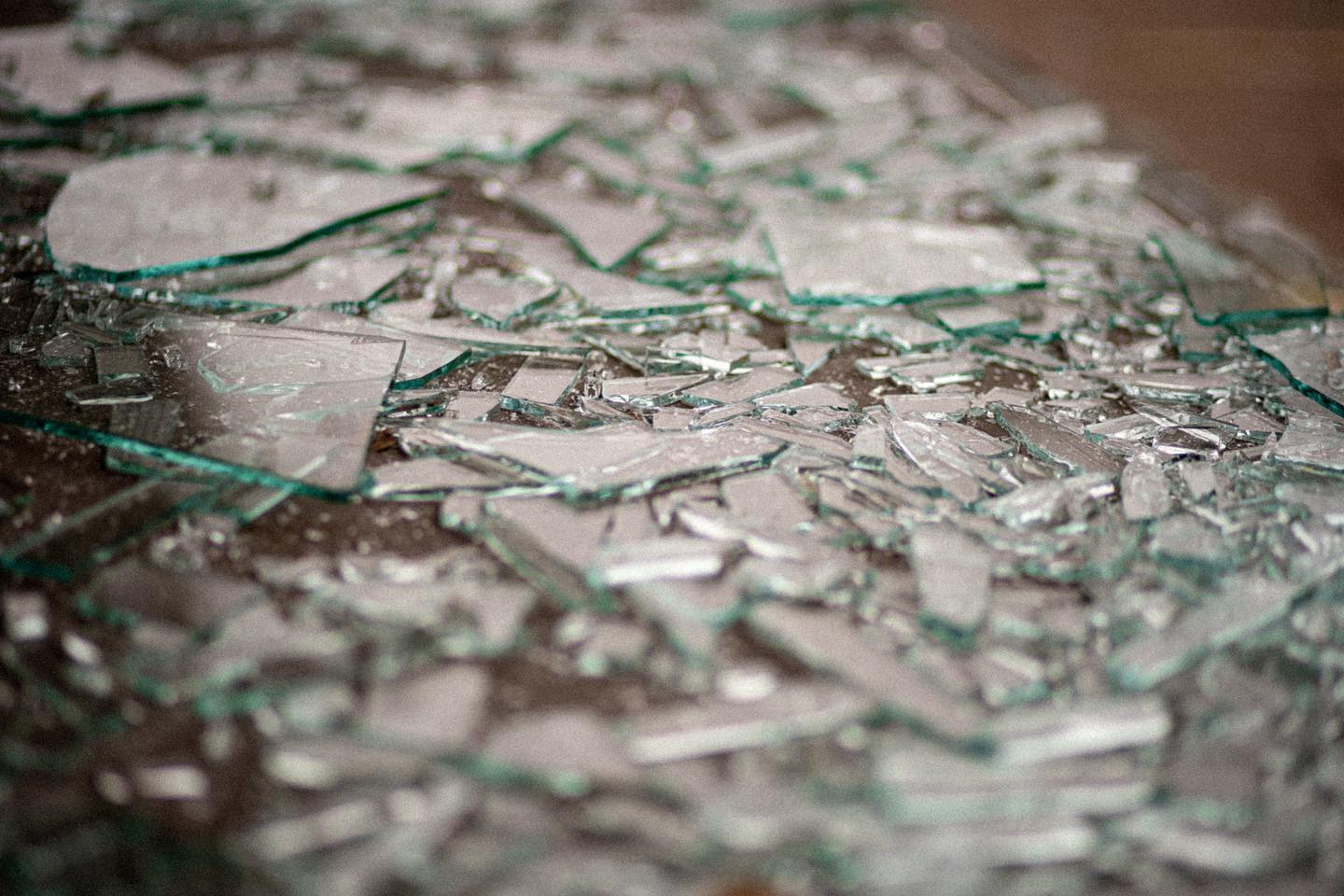
The city streets speak with alarms now. A strike, an explosion—and everything starts screaming. I am walking down one of the main streets towards my flat, less than a kilometer away. I turn towards my house.
I inspect some of the buildings. And I realize that Vita and I are living in the middle of a game of Battleship. Our house is a cell that so far has been lucky.
When I have half a kilometer to go, a shell falls in a yard near me. A man knocks me to the ground with all his weight. With soil in my mouth and eyes, I get up. I take the last cigarette out of my pocket. Everyone is fine; even the windows in the houses remain intact. Then I hear the whistling sounds above, and the shelling begins.
Planes again at night. They dropped a bomb in the center, where some people lived who three days ago had told us they were afraid to flee Chernihiv. Besides, they said, the center of the city was calm.
From that night, artillery shelling was no longer limited to the outskirts of Chernihiv. Shells started hitting everywhere.
This was when we decided to look for anyone who wanted to leave, cram everyone we can in the car. And leave. There was already a pile of shot-up cars in front of us. But we took the risk and drove. Through fields, small villages, mud.
Dad
At the last checkpoint outside Chernihiv, the children notice the troops through the window. They know their father is at war. The older boy starts knocking on the window.
“Is Dad there too? Where’s Dad?”
Dad is fighting the ‘Russian folk tale’.
Have read to the end! What's next?
Next is a small request.
Building media in Ukraine is not an easy task. It requires special experience, knowledge and special resources. Literary reportage is also one of the most expensive genres of journalism. That's why we need your support.
We have no investors or "friendly politicians" - we’ve always been independent. The only dependence we would like to have is dependence on educated and caring readers. We invite you to support us on Patreon, so we could create more valuable things with your help.
Reports130
More






